unity第三人稱射擊游戲
Previous article
上一篇文章
The economics literature distinguishes the quality of a game’s information (perfect vs. imperfect) from the completeness of a game’s information (complete vs. incomplete). Perfect information means that every player is perfectly informed of all the actions that happened in the game, including the starting state of the game. Complete information means that players possess all relevant information about their opponents, including their objectives, their possible actions, and their preferences. In economics, games are classified according to these two dimensions:
經濟學文獻從游戲的信息(完全與不完全)的完整性區分了游戲的信息質量 (完美與不完美)。 完美的信息意味著每個玩家都可以完美地了解游戲中發生的所有動作,包括游戲的開始狀態。 完整的信息意味著玩家擁有有關對手的所有相關信息,包括他們的目標,他們可能采取的行動以及他們的偏好。 在經濟學中,游戲根據以下兩個方面進行分類:
In the previous article, we talked about social deduction games — a genre of game where the influence currency (specifically, social influence) is used to mediate the initial imbalance between the power and information currencies of two teams. The information in social deduction games is imperfect and incomplete because while the rules, the objectives, and the possible information in the game are common knowledge, some players have no knowledge of the starting state of the game, or of which actions were taken by which players. Effectively, the “good” team in a social deduction game starts somewhere in the bottom-left quadrant and the “bad” team starts somewhere in the top-right quadrant; the bad team then tries to thwart the good team’s attempts to reach information parity.
在上一篇文章中,我們討論了社交演繹游戲-一種游戲類型,其中影響力貨幣(特別是社會影響力)用于調解兩個團隊的力量和信息貨幣之間的初始失衡。 社交演繹游戲中的信息是不完美且不完整的,因為盡管游戲中的規則,目標和可能的信息是常識,但有些玩家卻不知道游戲的開始狀態或采取了哪些行動。玩家。 實際上,社交演繹游戲中的“好”團隊從左下象限開始,而“差”團隊則從右上象限開始。 壞團隊然后試圖挫敗好團隊達到信息均等的嘗試。
In this article, we discuss perfect information games — the right half of our diagram. As it so happens, almost all of these games also have complete information. Perfect incomplete information games are (unsurprisingly) rare, but they do exist and I will touch on them in future articles.
在本文中,我們討論了完美的信息游戲-圖的右半部分。 碰巧的是,幾乎所有這些游戲也都具有完整的信息。 完美的不完整信息游戲很少(毫無疑問),但是它們確實存在,我將在以后的文章中進行介紹。
熱身 (Warming Up)
Many beloved perfect information games started off as war games designed to help military generals sharpen their strategic thinking. Chess, xiangqi, and shogi likely have a common ancestor in chaturanga, a game played in the Gupta Empire in the 6th century AD. Chaturanga translates to “having four parts”, referring to the four divisions of an army — infantry, cavalry, chariotry, and elephantry — and involves encircling the enemy king (“checkmate” translates to “the king is dead” or “the king is helpless”, from the Persian shah mat). Go, also an encirclement game (but of territory, not of a particular piece), was created much earlier in China (possibly as early as 2000 BC) and eventually became xiangqi’s upper-class cousin, played by elites. These games have stood the test of time and are as much cultural artifacts as they are games. They have captivated generation after generation as players continue to uncover new insights about the games’ strategic depth — insights whose discovery is being accelerated today by artificial intelligence projects like AlphaGo. War games aside, though, “perfect information” is less a genre of game and more a specific property of the game’s information currency.
許多備受喜愛的完美信息游戲開始于戰爭游戲,旨在幫助軍事將領們提高其戰略思維。 國際象棋,象棋和將棋在加圖蘭加可能是一個共同的祖先,該游戲是在公元6世紀古普塔帝國玩的。 喬圖蘭加(Chaturanga)譯為“具有四個部分”,指的是陸軍的四個師–步兵,騎兵,戰車和大象–包括包圍敵方國王(“將軍”翻譯成“國王已死”或“國王已死”)。無助”, 來自波斯語shah mat )。 圍棋,也是一種包圍游戲(但不是領土,而是一塊領土),是在中國更早( 可能早在公元前2000年 )創造的,并最終成為了由精英們扮演的象棋的上流表弟。 這些游戲經受了時間的考驗,并且與游戲一樣具有許多文化產物。 隨著玩家不斷發現有關游戲戰略深度的新見解,他們一代又一代著迷。這些見解如今已被AlphaGo等人工智能項目所加速。 但是,除了戰爭游戲以外,“完美信息”不是游戲的一種,而是游戲信息貨幣的一種特定屬性。
One consequence of having a perfect information game is that if the game mechanics allow players to directly interact, the game must be turn-based. If players were allowed to act simultaneously, then players would not have perfect knowledge of all previous actions in the game. Because perfect information games are often turn-based, the actions in these games (and the resulting game states) are amenable to being visually represented as trees. If you’ve ever taken an advanced course in game theory, probability, economics, or computer science, you’ll have seen diagrams like these:
擁有完善的信息游戲的一個后果是,如果游戲機制允許玩家直接互動,則游戲必須基于回合制。 如果允許玩家同時行動,那么玩家將不會完全了解游戲中的所有先前動作。 由于完美的信息游戲通常是基于回合制的,因此這些游戲中的動作(以及最終的游戲狀態)都可以直觀地表示為樹。 如果您曾經學習過博弈論,概率論,經濟學或計算機科學方面的高級課程,那么您將看到如下圖:

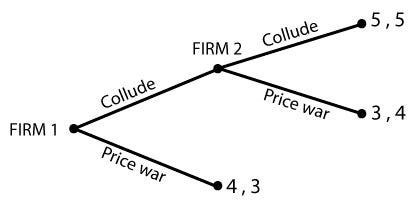
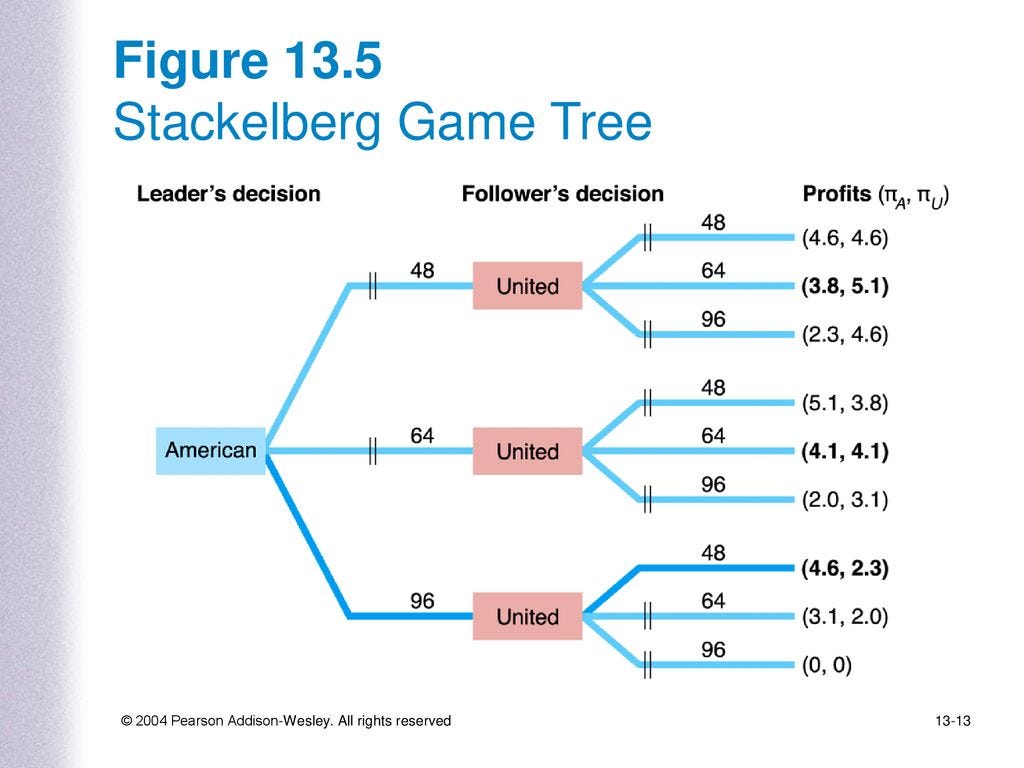

We’ll avoid getting into the weeds of specific game trees in this article, but the one relevant concept here is the notion of a branching factor. For an individual node (game state) in the tree, the branching factor is the number of new nodes generated from the original one; each possible action you can take from that node gives rise to a new “branch” and a new resulting node. We are usually interested in the average or effective branching factor of a typical node at a given level of the tree.
在本文中,我們將避免涉及特定游戲樹的雜草,但是此處一個相關的概念是分支因子的概念。 對于樹中的單個節點(游戲狀態),分支因子是從原始節點生成的新節點數。 您可以從該節點執行的每個可能操作都會產生一個新的“分支”和一個新的結果節點。 我們通常對樹的給定級別上典型節點的平均或有效分支因子感興趣。
The difficulty of a perfect information game is directly proportional to its average branching factor. Perfect information games can take years to master and are notoriously difficult. Not because players lack meaningful information, but because they are overwhelmed by the burden of understanding its implications. You can only think so many moves ahead.
完美信息游戲的難度與它的平均分支因子成正比。 完美的信息游戲可能需要花費數年才能掌握,而且非常困難。 不是因為玩家缺乏有意義的信息,而是因為他們不堪理解其含義的負擔。 您只能認為前進的步伐很多。

In the first article of this series, we discussed how currencies that never differ in quantity across teams can be excluded from our analysis. Since all players have access to exactly the same information in perfect information games by definition, information is not a relevant currency here. We are therefore left to grapple with just power and influence.
在本系列的第一篇文章中 ,我們討論了如何從團隊中排除數量上永不相同的貨幣。 根據定義,由于所有玩家都可以在完美的信息游戲中獲得完全相同的信息,因此這里的信息不是一種重要的貨幣。 因此,我們只剩下權力和影響力。
功率 (Power)
Because we are by and large talking about turn-based games, one power currency that deserves attention is turn order.
因為我們基本上都在談論回合制游戲,所以值得關注的一種強國貨幣是回合制。
In games with two teams, there is often a slight advantage associated with going first. This is especially true in games with high branching factors like chess and go, where small advantages accumulate like compound interest over several levels of the game tree to create winning states. Different games compensate for this known power imbalance in various ways — players may play multiple games as both sides in competitive settings, the advantaged side may be given a handicap, or the win condition for the advantaged side may be altered altogether. For example, in armageddon chess, the player with the White pieces is given more time on their clock, but Black wins the game if they secure at least a draw (while White has to win outright).
在有兩支球隊的比賽中,先發通常會帶來一點優勢。 在象棋和圍棋之類具有高分支因子的游戲中尤其如此,在這種情況下,小的利益會像在多個游戲樹級別上的復利一樣積累,以創建獲勝狀態。 不同的游戲以各種方式補償這種已知的力量失衡-玩家可以在競爭環境中作為雙方玩多場游戲,可以給優勢方讓分,或者可以完全改變優勢方的獲勝條件。 例如,在世界末日象棋中,擁有白色棋子的玩家有更多的時間來計時,但如果黑人至少贏得平局,則黑棋將贏得比賽(而白棋必須完全獲勝)。
In games with three or more teams, the advantage of a particular position in the turn order becomes complicated to assess, especially if players can form impromptu, implicit agreements to eliminate other players first. Multiplayer variants of perfect information games have an even larger branching factor than their two-team counterparts, but they can be a great way to introduce a cooperative dynamic to games that makes turn order more irrelevant.
在擁有三支或更多支球隊的比賽中,評估轉彎順序中特定位置的優勢變得很困難,尤其是如果玩家可以形成即席隱含協議以首先淘汰其他玩家。 完美信息游戲的多人游戲變體的分支因子甚至比兩團隊的同類游戲更大,但它們可能是將合作動態引入游戲的絕佳方式,從而使回合順序變得無關緊要。




The most prominent power currency is the resources of the game itself — typically your pieces. In games like Ludo, Othello, and Go, all pieces move in the same way and therefore have equal value. Points are accumulated based on the particular arrangement of the pieces on the board (the theme generally being “capture territory”), not on the inherent value of the pieces themselves.
最突出的動力貨幣是游戲本身的資源 -通常是您的作品。 在Ludo,Othello和Go等游戲中,所有棋子都以相同的方式移動,因此具有同等的價值。 積分是根據棋子在棋盤上的特定排列(主題通常是“捕獲區域”)而不是棋子本身的內在價值來累積的。

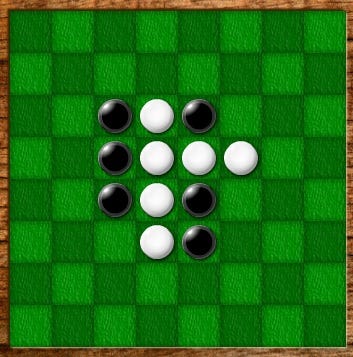

In games like checkers, chess, and shogi, pieces can move in different ways and therefore have different values. A numerical value might be assigned to the value of the pieces, but experts frequently disagree on what the correct values should be, especially if they are tangential to the game’s win condition (the theme generally being “capture your opponent’s most important piece”).
在諸如跳棋,國際象棋和將棋的游戲中,棋子可以以不同的方式移動,因此具有不同的價值。 可能會為碎片的值分配一個數值,但是專家經常不同意正確的值,特別是如果這些值與游戲的獲勝條件相切時(主題通常是“捕獲對手最重要的碎片”)。



Most perfect information games start with equal resources for all teams. This simplifies the analysis of power considerably and makes the values of individual pieces less relevant because anything I can do to you, you can do to me. As the game progresses, the balance of power shifts, and in most situations, a decisive power advantage should lead to victory. However, power imbalances matter more in games which feature higher variance between the abilities of individual pieces. For example, in chess, the total power of your team is almost always decreasing, and the queen dominates every other piece by far. In such an ecosystem, it is almost impossible to recover from a significant power imbalance short of an immense amount of compensation in your influence currency. Contrast this with shogi, where pieces can reenter the game after they are captured, and the most powerful piece is only the rook. This often leads to mutual checkmating attacks even in the presence of significant power imbalance.
對于所有團隊來說,最完美的信息游戲都以平等的資源開始。 這大大簡化了功率分析,并使各個零件的價值不那么相關,因為我對您可以做的一切,您都可以對我做。 隨著比賽的進行,力量的平衡會發生變化,在大多數情況下,決定性的力量優勢應該會導致勝利。 但是,功率不平衡在游戲中更為重要,因為游戲的各個部分的能力之間存在較大差異。 例如,在國際象棋中,您的團隊的總實力幾乎總是在下降,而女王/王后則一直統治著其他所有領域。 在這樣的生態系統中,幾乎不可能從重大的電力失衡中恢復過來,而沒有影響貨幣的巨額補償。 與將棋相比,將棋子可以在被捕獲后重新進入游戲,而最強大的棋子只是新手。 即使存在嚴重的功率不平衡,這也經常導致相互驗證攻擊。
Nevertheless, different teams in perfect information games can start with different resources — or accumulate different resources along the way. Consider some variants of chess:
但是,在完美的信息游戲中,不同的團隊可以從不同的資源開始-或在此過程中積累不同的資源。 考慮一下國際象棋的一些變體:

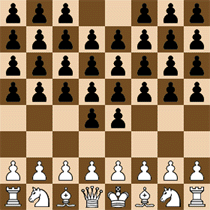
Or consider other genres of games altogether, like Bananagrams — a Scrabble-like game where you must use your own stash of lettered tiles to build a valid crossword before anyone else, while drawing additional tiles from a communal pile — and Monopoly. Because players can see everyone’s tiles in real time but can only interact with their own, Bananagrams is one of those rare perfect information games that is not turn-based. Players start off with different resources (i.e. different letters) and continue to receive different resources throughout the game, but the game is balanced around the fact that the English language contains enough words to accommodate most combinations of letters. Similarly, players in Monopoly accumulate different resources (money, properties, houses, hotels) along the way. The game is balanced around when these resources are dispensed, and what benefits are afforded to players who own a particular set of color groups, utilities, etc.
或完全考慮其他類型的游戲,例如Bananagrams(類似Scrabble的游戲),在這種游戲中,您必須使用自己的帶字母的積木藏起來,在其他任何人之前構建有效的填字游戲,同時從公共堆中獲取其他積木和壟斷。 由于玩家可以實時看到每個人的圖塊,但只能與自己的圖塊交互,因此Bananagrams是那些罕見的非回合制完美信息游戲之一。 玩家以不同的資源(即不同的字母)開始,并在整個游戲中繼續獲得不同的資源,但是游戲圍繞以下事實進行了平衡:英語包含足夠的單詞以容納大多數字母組合。 同樣,“壟斷”中的參與者在此過程中積累了不同的資源(金錢,財產,房屋,酒店)。 游戲在分配這些資源的時間以及擁有一組特定顏色組,實用程序等的玩家所能享受的收益方面保持平衡。

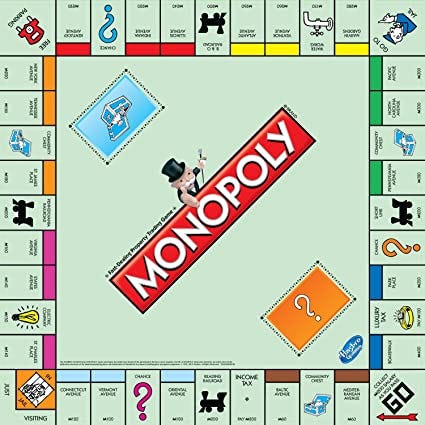
Just to drive the point home, these games are still perfect information games because all of these resources are known about from the beginning of the game. Players can plan around them — even when randomness plays a role in a player’s actions.
這些游戲只是將信息帶回家,仍然是完美的信息游戲,因為所有這些資源都是從游戲一開始就知道的。 玩家可以圍繞它們進行計劃-即使隨機性在玩家的行為中起作用。
The last power currency worth mentioning is time. A player can spend endless amounts of time contemplating their move in a game with a high branching factor, so time is a very pragmatic currency for managing the duration of a game and encouraging more daring play. Typically time is implemented as a currency for the win condition: players lose if they run out of the time before their opponents (think chess clocks and increments, or the byoyomi system in go).
最后一個值得一提的動力貨幣是時間 。 玩家可以花費大量時間來考慮在分支因子較高的游戲中的移動,因此時間是管理游戲持續時間并鼓勵更大膽游戲的非常實用的貨幣。 通常情況下,時間是作為獲勝條件的一種貨幣來實現的:如果玩家在對手之前的時間用完了,他們就會輸錢(想想國際象棋的鐘表和增量,或者在使用byoyomi系統)。
影響 (Influence)
Unlike in social deduction games, where the influence currency is immediately accessible because of our innate familiarity with the “rules” of social interaction, influence in a perfect information game can be inscrutable to the novice. That is not to say that social influence is any less complex or multifaceted, but understanding influence in games where everything is known is a lifelong endeavor with many peaks to traverse and a near-infinite skill cap. To put this in perspective, consider two facts: 1) any decent AI for a perfect information game can easily defeat the human world champion in that game, and 2) the best AIs still lose to each other because they do not fully understand the influence currency.
與社交演繹游戲不同,在社交演繹游戲中,由于我們天生就熟悉社交互動的“規則”,因此可以立即獲得影響力貨幣,而對于新手來說,在完美的信息游戲中的影響力是難以理解的。 這并不是說社會影響力沒有那么復雜或多方面,而是要了解在一切已知的游戲中的影響力是一項畢生的努力,需要穿越許多高峰,并且技能上限幾乎是無限的。 為了正確理解這一點,請考慮以下兩個事實:1)一款完美的信息游戲中任何一款像樣的AI都可以輕易擊敗該游戲中的人類世界冠軍; 2)最好的AI仍然會彼此失去,因為它們無法完全理解其影響力。貨幣。
At its core, your understanding of influence comes down to your ability to look at the current state of the game and assess how well each team is doing, what each team’s plan should be, and why. Perfect information games test how reliable your heuristics are for navigating and pruning the morass of possible actions you could take when you invariably find yourself in a part of the game tree that you’ve never encountered before — which is almost guaranteed to happen every time you play. Getting better at these games involves assessing myriad factors about a game state. Not just who has more resources (power imbalance), but who has more “space”, whose pieces are better “developed”, who has the “initiative”, who is “attacking” and “defending”, who is making better use of their “tempi”, and so on — where all these terms mean something specific in different games and are highly context dependent.
從本質上講,您對影響力的理解取決于您查看游戲當前狀態并評估每個團隊的表現,每個團隊的計劃應該是什么以及為什么的能力。 完美的信息游戲可以測試您的試探法在導航和修剪各種雜物時的可靠性,而這些雜物總是會出現在您從未遇到過的游戲樹的一部分中時,幾乎可以保證每次您都會遇到這種情況玩。 在這些游戲中變得更好涉及評估有關游戲狀態的眾多因素。 不僅誰擁有更多的資源(權力失衡),誰擁有更多的“空間”,誰擁有更好的“開發”能力,誰擁有“主動性”,誰擁有“進攻”和“捍衛”能力,誰就能更好地利用他們的“ tempi”,依此類推-所有這些術語都表示不同游戲中的特定內容,并且高度依賴于上下文。
The critical skill in these games is knowing when and how to trade power for influence. This is something AI has been enlightening us on for a long time, especially so in recent years with the advent of neural-network AIs. These AIs do not rely on human-given heuristics. Instead, they build up their own positional understanding by playing games against themselves millions of times. I’ll discuss AlphaGo and AlphaZero in more detail in the next article.
這些游戲中的關鍵技能是知道何時以及如何用力量交換影響力。 這是AI長期以來一直啟發我們的事情,尤其是近年來隨著神經網絡AI的出現。 這些AI不依賴于人類賦予的啟發式算法。 相反,他們通過與自己進行數百萬次比賽來建立自己的位置理解。 在下一篇文章中,我將更詳細地討論AlphaGo和AlphaZero。
下次之前... (Before next time…)
In perfect information games, players are armed with the power currencies of turn order, resources, and time as they wade through a deluge of possible actions whose consequences cannot be calculated to endgame. Perfect information games compensate for the irrelevance of the information currency with a richness and inexhaustible depth in their influence currency.
在完美的信息游戲中,玩家在經歷大量可能的行動而無法計算最終結果時,會掌握著回合順序,資源和時間的強大貨幣。 完美的信息游戲以其影響力貨幣的豐富性和不竭深度來補償信息貨幣的無關緊要。
With our introduction to social deduction games and perfect information out of the way, we have set the stage for a deeper exploration of the implications of the market economy framework. In the next article I will talk about the art of actually winning these kinds of games by carefully managing your power and influence currencies, which I will analogize to cash and unrealized gain in a stock market.
通過介紹社交演繹游戲和完美的信息,我們為深入研究市場經濟框架的影響奠定了基礎。 在下一篇文章中,我將討論通過謹慎地管理您的力量和影響貨幣來真正贏得這類游戲的藝術,我將其模擬為股票市場中的現金和未實現的收益。
下一篇文章… (Next article…)
翻譯自: https://medium.com/there-will-be-games/on-games-part-3-perfect-information-games-95c0b9600070
unity第三人稱射擊游戲
本文來自互聯網用戶投稿,該文觀點僅代表作者本人,不代表本站立場。本站僅提供信息存儲空間服務,不擁有所有權,不承擔相關法律責任。 如若轉載,請注明出處:http://www.pswp.cn/news/389852.shtml 繁體地址,請注明出處:http://hk.pswp.cn/news/389852.shtml 英文地址,請注明出處:http://en.pswp.cn/news/389852.shtml
如若內容造成侵權/違法違規/事實不符,請聯系多彩編程網進行投訴反饋email:809451989@qq.com,一經查實,立即刪除!--一文讀懂垃圾回收)




)













